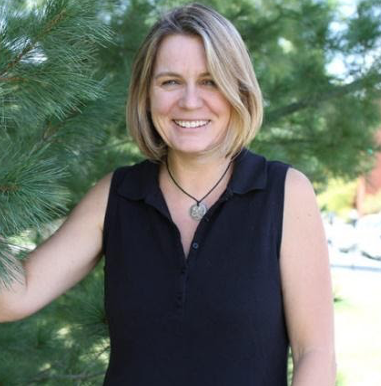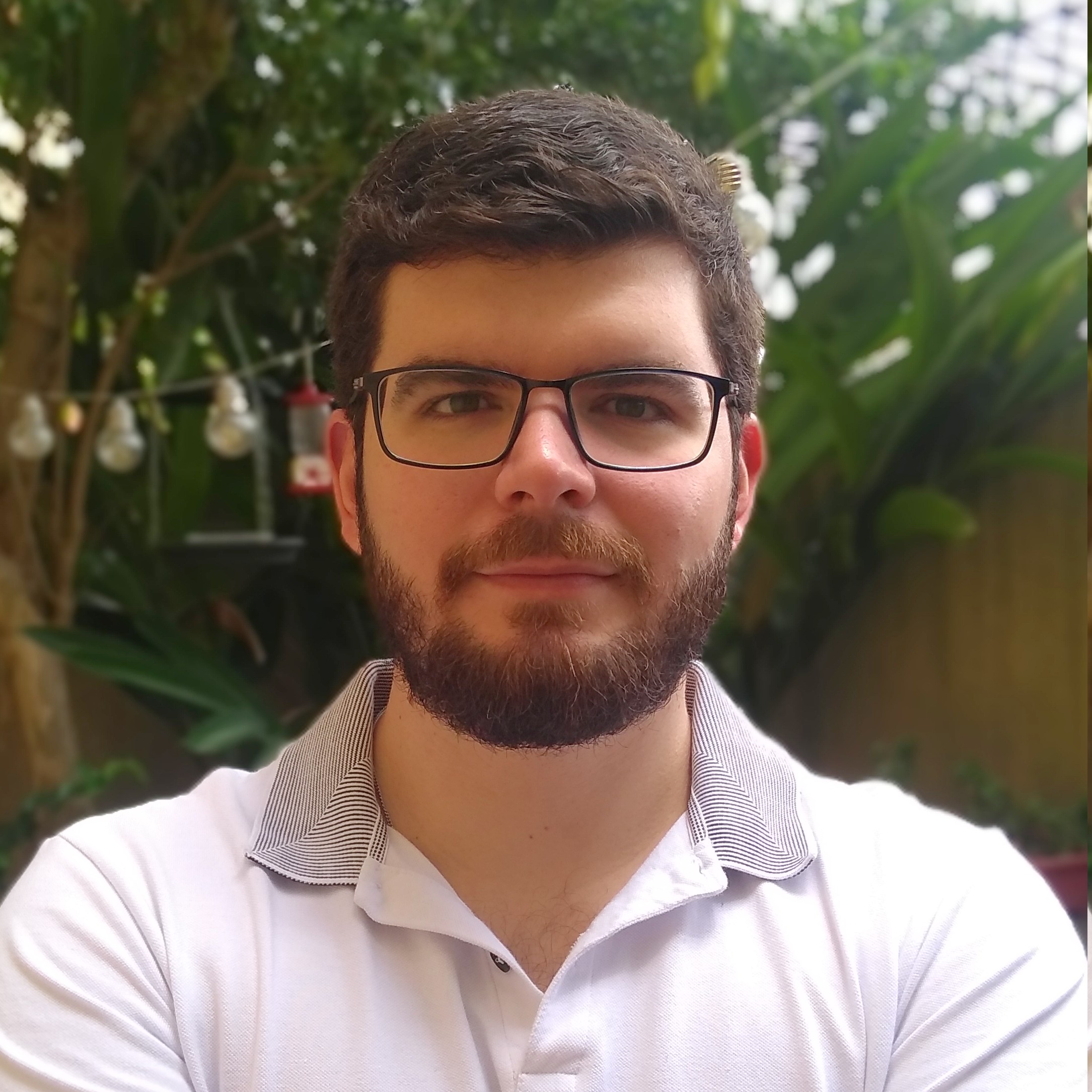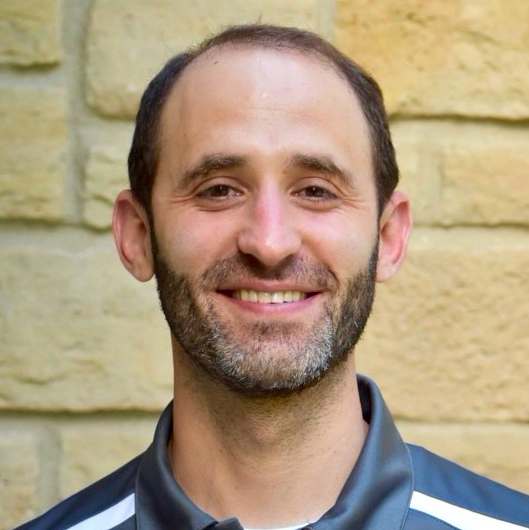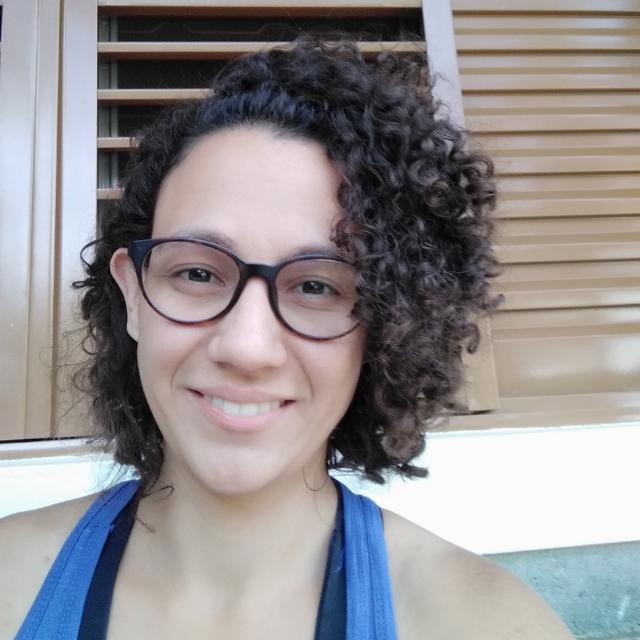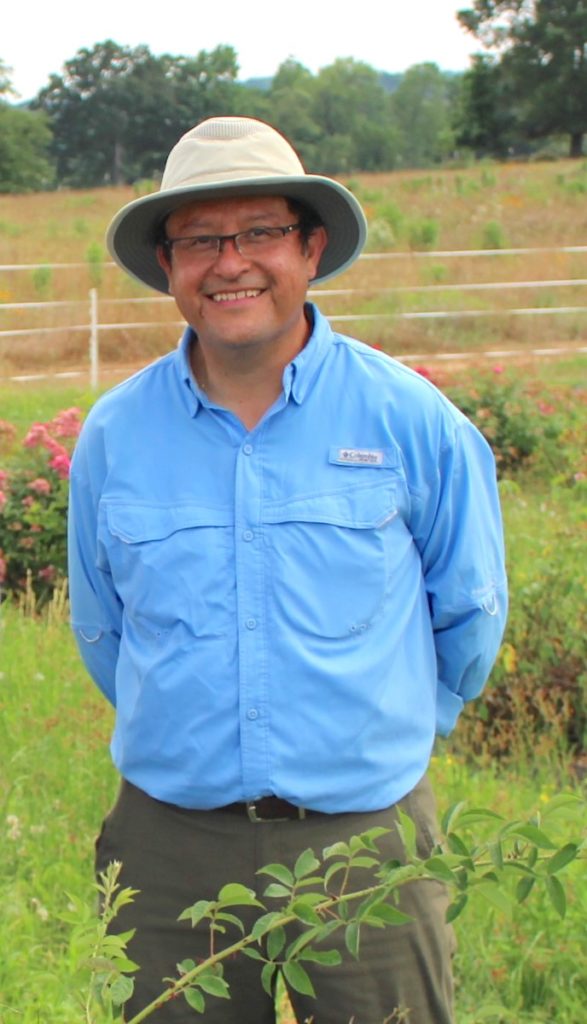Workshop Agenda | Presenters | Links for Software and Programs
Pre-Workshop Computational Support Sessions
- December 6: Genotype Calling (12pm CST)
- December 13: Mapping/QTL Analysis (12pm CST)
- December 20: Genomic Selection and other topics (12pm CST)
Agenda
| January 12 | ||
|---|---|---|
| Time (US Pacific) | Presenter | Topic |
| 8:30 | David Byrne | Introduction |
| 8:45 |
Dorrie Main Delany Baum |
Community Resource website |
| 9:00 | Cris Taniguti et al. | Reads2Map: Practical and reproducible workflows to build polyploid linkage maps from sequencing data |
| 9:30 | Tim Koorevaar | Construction of a strawberry breeding core collection to capture and exploit genetic variation |
| 9:45 | Poster setup | Side room |
| 10:00 | Break | |
| 10:15 |
Giorgio Tumino |
Multiparental QTL analysis using mpQTL |
| 11:45 | Ran Wang (virtual) | Genetic mapping and QTL analysis of the sex locus in tetraploid kiwiberry |
| 12:00 |
Lunch Office Hours |
Main room - Multiparental QTL analysis using mpQTL Side room -- Reads2Map |
| 1:00 |
Marcelo Mollinari Gabriel Gesteira |
MAPpoly and QTLpoly: interconnected sweetpotato families |
| 2:00 | Simon Fraher | Discovery of major QTL conferring resistance to root-knot nematodes (Meloidogyne enterolobii, M. incognita) in the sweetpotato (Ipomoea batatas) mapping population "Tanzania" x "Beauregard" and development of KASP-based assays for marker-assisted breeding |
| 2:15 | Jeff Endelman | |
| 2:45 | Guilherme da Silva Pereira | Development and validation of KASP markers for marker-assisted selection in autohexaploid sweetpotato breeding |
| 3:00 |
Poster session #1 1. Ao Jiao et al. 2. Haramrit Gill et al. 3. Heeduk Oh et al. 4. Jeewan Pandey et al. 5. Sathya Jali et al. |
Side room and virtual breakout rooms 1. Exploration of the Genetic Background of Potato Tuber Dormancy in Response to Cold Storage 2. Identification of Quantitative Trait Loci Controlling Shoot Length, Internode Length, and Number of Internodes in Tetraploid Roses 3. Identification of QTLs related to fruit texture at harvest and postharvest in blueberry 4. Genome-wide association studies of mineral content in potato tubers and identification of clones with high genomic-estimated breeding value 5. Elimination of Pungency in Allotetraploid Brassica juncea Through Gene Editing of the Multicopy Myrosinase Gene Family |
| 3:45 | Paterne Agre | Effort towards yam breeding modernization using genomic tools |
| 4:00 | David Byrne |
Announcements |
| 4:05 | Office Hours |
Main room - MAPpoly/QTLpoly Side room - Genetic marker imputation |
| 5:00 | David Byrne | Adjournment |
| January 13 | ||
| Time (US Pacific) | Presenter | Topic |
| 8:30 | David Byrne | Welcome and announcements |
| 8:35 | Jeekin Lau | Software comparisons: QTL versus genomic selection approaches in breeding in an autotetraploid rose dataset |
| 9:05 |
Roeland Voorrips |
polyHaplotyper -- Haplotype construction with SNP data |
| 10:15 | Break | |
| 10:30 | Lillian M. Hislop | Tools and Techniques for GWAS and Genomic Prediction in Blueberries with Breeding Insight |
| 10:45 |
Tim Millar Susan Thomson |
Haplotype assembly De novo assembly using GBS derived from triplets/quartets and small family datasets |
| 11:45 |
Mateus Mondin |
Chromosome synteny by comparative genome analysis revisits polyploidy contribution to legumes evolution |
| 12:00 |
Lunch Office Hours |
Main room - polyHaplotyper Side room - MChap: haplotype assembly Virtual breakout room - Software comparisons |
| 1:00 | Jeff Endelman | Genomic selection with R package StageWise |
| 1:30 | Hamid Ashrafi | Genome-wide association mapping of fruit quality-related traits in a diversity panel of blueberries |
| 1:45 | Marlee Labroo | Comparisons of hybrid breeding strategies in clonal polyploids |
| 2:30 | Olivia Angelin-Bonnet | The hidecan package: visual integration of GWAS and differential expression results |
| 2:45 | John McCallum |
Building Polyploid Statistical Genetics Workflows in R with the Targets and Future Packages |
| 3:00 |
Poster session #2 1. Beatriz Tome Gouveia 2. Lushan Ghimire 3. Paul Adunola 4. Sanjeev Gautam 5. Soukeye Conde 6. Tessa Hochhaus |
Side room and virtual breakout rooms 1. Turfgrass breeding dashboard for a multi-state collaborative project 2. Identification of Genomic Regions Associated with Bacterial Wilt Resistance in Southern Highbush Blueberries Using Genome-Wide Association Study 3. Integration of Genetic and Data-Driven Methods for Optimizing Genomic Prediction in Autotetraploid Blueberries 4. Investigating the genetic background of potato tuber defects caused by heat stress 5. Development and characterization of a unique genetic resource for allele mining and peanut improvement in Africa 6. Meta-analysis of rose rosette disease resistance quantitative trait loci and search for candidate genes |
| 4:00 | David Byrne | Announcement |
| 4:05 |
Office Hours Main room - Genomic selection Side room - Hybrid breeding strategies |
|
| 5:00 | David Byrne | Adjournment |
Presenter Information
|
Dr. David Byrne (PD), the Basye Endowed Chair in Rose Genetics, and a Professor in Horticultural Sciences at Texas A&M University. He works internationally in Prunus and Rosa breeding and genetics. He led the SCRI Combating Rose Rosette Disease project, worked with the SCRI RosBREED 2 project, and currently chairs the National Clean Plant Network for Roses. He routinely works with numerous scientists, private breeding programs, ornamental nurseries, marketers, and producers as well as ornamental hobbyist groups. He has, in collaboration with Dr. Klein, developed a GBS pipeline for Rosa, created high density rose maps, and is working with Dr. Riera-Lizarazu to incorporate genomic approaches (MAB, GWAS, GS) into the rose breeding program to enhance disease resistance (RRD, black spot, cercospora), flower productivity, and horticultural quality of roses. Over the past decade, he has mentored 18 graduate students, published 37 refereed and 27 non-refereed publications, has given about 140 talks, and released 23 Prunus and 6 Rosa cultivars. He reaches out to the rose community via Facebook and with Rose Updates. He is the Project Director and will coordinate the training aspects of the project and work with Drs. Riera-Lizarazu and Klein on the validation of the computational tools on multiple rose datasets. He will discuss the unique challenges of the polyploid crop breeding community and summarize survey results on the status of genomics-assisted breeding among our community. |
|
Delany Baum, Project Coordinator: Delany graduated from the University of North Texas in 2020 with a Master of Science degree in Environmental Science. She has a background in environmental education and has conducted research in the fields of plant physiology, ethnobotany, and ecology. Delany is the project coordinator for the Tools for Polyploids project and oversees the project's social media pages and website. |
|
Dr. Dorrie Main is a Professor of Bioinformatics in the Department of Horticulture at Washington State University. She runs a highly collaborative, multi-disciplinary research program that has been funded through public (NSF, USDA) and industry (cotton, tree fruit, and legume) sources. The research develops database resources for specific crops (e.g., Genome Database for Rosaceae, CottonGen, Citrus Genome Database, Cool Season Food Legume Database, Genome Database for Vaccinium), online computational tools (e.g. GenSAS), sequence analysis pipelines (e.g. RefTrans), and generic database platforms (e.g. Tripal). The lab also identifies genomic regions and markers controlling important traits and studies genome evolution (e.g. synteny analysis in horticultural crops). All of these efforts seek to provide genomic, genetic, and breeding resources to enable basic, translational, and applied research. They are active members of the AgBioData Consortium and host the AgBioData website. |
|
Dr. Roeland Voorrips is a senior researcher at Wageningen Research – Plant Breeding. After his study Plant Breeding at Wageningen University he was employed at a vegetable seed company before joining Wageningen Research in 1986. He has studied disease and pest resistance in many vegetable crops, and he has been working on quantitative and population genetics methods, including linkage and QTL mapping. Since 2010, he became involved in the development of genetic tools for polyploid crops. He has published several genetics software packages, including MapChart, Pedimap, PediHaplotyper, fitTetra / fitPoly and PedigreeSim, and contributed to others including joinmap and polymapR. |
|
Dr. Marcelo Mollinari is a Senior Research Scholar at North Carolina State University working with the genetics of complex polyploids. He is the creator and maintainer of the R package MAPpoly, which will be one of the topics of the Tools for Genomics-Assisted Breeding in Polyploids Training Workshop. Marcelo also co-created OneMap, an R package for linkage mapping in outcrossing species. In 2008, Marcelo started working on the genetics of polyploids at the University of São Paulo, Brazil. He published works on assessing dosage-based markers in sugarcane and assisted the development of the software SuperMASSA. In 2014, he was a Visitor Researcher at Purdue University where he continued his studies on genetic linkage in polyploids, with particular focus on high-level ploidy species. In 2016, he started to work on the Genomic Tools for Sweetpotato Improvement project, being responsible for the genetic mapping of several biparental hexaploid sweetpotato populations. During that project, he implemented MAPpoly and built three ultra-dense multilocus genetic maps with the reconstruction of the full haplotypes of the parents and offsprings. The resulting maps served as the basis to study the inheritance patterns and meiotic behavior of sweetpotato as well as QTL and genomic selection. He also consults with researchers from several other polyploid species, such as potato, forage crops, kiwifruit, and strawberry. To check Marcelo's work, computer codes, datasets, and presentations, please visit his GitHub page at https://github.com/mmollina. |
|
Dr. Gabriel Gesteira is a postdoctoral research scientist at North Carolina State University (NCSU). He has a Ph.D. in Plant Breeding and Genetics from the “Luiz de Queiroz” College of Agriculture, University of São Paulo (ESALQ/USP), and is the current maintainer of QTLpoly, an R package for QTL mapping in autopolyploids. His current work focuses on the development of computational tools and their application for linkage analysis, QTL mapping, and genomic prediction in polyploid species. Gabriel's interests involve polyploidy, plant breeding, quantitative genetics, statistical genetics, and programming. |
|
Dr. Jeffrey Endelman is an Associate Professor at the University of Wisconsin–Madison and leads the university potato breeding program. He is a co-developer of 16 potato varieties and several software packages for genomics-assisted breeding, including rrBLUP, GWASpoly, polyBreedR, and diaQTL. Endelman has co-authored 35 publications and served on the graduate thesis committees of 26 students. He is a member of the editorial boards for Genetics, Theoretical and Applied Genetics, and The Plant Genome. |
|
Dr. Jeekin Lau is a postdoctoral research associate at Texas A&M University. Jeekin currently works on utilizing and comparing available genetic tools for tetraploid roses. He has experience using tetraploid SNP-array-based genotyping, genotype calling, linkage mapping, and QTL mapping for disease and horticultural traits. Jeekin will be helping attendees with the SCRI Polyploid Computing Support Group. |
|
Dr. Cris Taniguti is a post-doctoral research associate in the Department of Horticultural Sciences at Texas A&M University. Her current work focuses on the development of bioinformatics workflows to perform SNP and dosage identifications comparing software efficiency. She also develops the VIEWpoly app, a graphical environment to evaluate linkage map and QTL analysis results. She is the current maintainer of OneMap, an R package to build linkage maps in F1 diploid outcrossing populations. Cris will be helping attendees with the SCRI Polyploid Computing Support Group. |
|
Dr. Oscar Riera-Lizarazu, Co-Director: Dr. Riera-Lizarazu is an Associate Professor in the Department of Horticultural Sciences at Texas A&M University, in College Station, TX, USA. Dr. Riera-Lizarazu works on rose genetics and breeding with the goal of developing, testing, and releasing improved varieties of roses with regional and national adaptation as well as conducting research on the use of genomics-based tools for rose variety development and understanding the genetic basis of traits in Rosa and related horticultural crops. Dr. Riera-Lizarazu has over 20 years of national and international research experience on plant genetics, cytogenetics, and breeding. Prior to his assignment at Texas A&M, Dr. Riera-Lizarazu held various senior-level positions in the private sector such as Global Wheat and Sorghum Breeding Leader at Dow AgroSciences and the North America (NA) Regional Crops’ Technology Leader at Corteva Agriscience, the Agricultural Division of DowDuPont. Prior to working in the private sector, Dr. Riera-Lizarazu served internationally in director-level positions at the Int. Crops Research Institute for the Semi-Arid Tropics (ICRISAT) in India and as a tenured faculty in the Department of Crop and Soil Science at Oregon State University, USA. Dr. Riera-Lizarazu has also held research scientist positions at the International Wheat and Maize Improvement Center (CIMMYT) in Mexico and the Bolivian Institute of Agricultural Technology (IBTA), Bolivia. Oscar Riera-Lizarazu received B.S. and M.S. degrees in Plant Science from the Utah State University and a Ph.D. in Plant Breeding and Genetics from the University of Minnesota, USA. |
|
Tim Millar is a member of the Bioinformatics team at Plant and Food Research and a Ph.D. student at Otago University, New Zealand. His interests include statistical genetics, Bayesian statistics, and software development. His Ph.D. topic is on identifying selective sweeps in a mixed-ploidy Kiwifruit (Actinidia spp.) breeding program. |
|
Dr. Susan Thomson is a senior Bioinformatician and researcher at The New Zealand Institute for Plant & Food Research (PFR). Susan started her plant research life as a member of the PFR team involved in the International Potato Genome Sequencing Consortium that published the potato genome and high-density linkage map. She then moved into the field of Bioinformatics to continue the analysis of genomic and genetic data from several polyploid crop species including potato, kiwifruit, and blueberry. She is now part of a team that is focused on the application of sequence-based genotyping and haplotyping to polyploid breeding material as well as investigating the genomics and genetics of inter-specific polyploid hybrids. |

Dr. Marlee Labroo is a Quantitative Genetics Specialist in the CGIAR Excellence in Breeding Program. She mainly works with the IITA yam, CIP potato, and CIP sweetpotato breeding teams, most of which use autopolyploids. She supports breeding program optimization and continuous improvement using stochastic simulation, data analysis, and logistics. Prior to joining the CGIAR, Dr. Labroo received her Ph.D. from the University of Illinois at Urbana-Champaign, during which time she also worked with IRRI. |

Dr. Giorgio Tumino is a researcher at the Wageningen Research – Plant Breeding, working on quantitative genetics. He studied plant disease resistance and adaptive traits in cereal crops (such as barley, oat, and durum wheat) and pedigree reconstruction in grapes. More recently, he focused on trait mapping and genomic prediction mainly on polyploid species (e.g. rose, phalaenopsis). He is a co-developer of mpQTL, an R package for QTL mapping in polyploid diverse populations using haplotype data. |
Links to Software and Programs
polyHaplotyper


